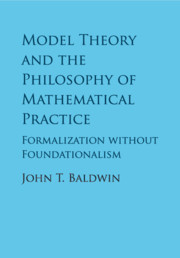2 - The Context of Formalization
from PART I - REFINING THE NOTION OF CATEGORICITY
Published online by Cambridge University Press: 19 January 2018
Summary
Bourbaki wrote ‘We emphasize that it [logical formalism] is but one aspect of this [the axiomatic] method, indeed the least interesting one.’ In this chapter, we begin the argument that Bourbaki have it backwards. Formal methods are not a pedantic puddle on the path to find the methods and principles that underlie a mathematical result but rather a stepping stone to understanding.
We explore the epistemological purposes of formalization along the lines of Manders (Chapter 2.1) and contrast Bourbaki's views with the contemporary mathematician, Kazhdan (Chapter 2.2). In Chapter 2.3 we take up Detlefsen's questions (page 15), and provide a criterion for the virtue of a property of a theory. In Chapter 2.4 we begin the explanation of how virtuous formal properties can provide a more fruitful way of organizing mathematics than that proposed by Bourbaki.
The Process of Formalization
In Chapter 1.1 we gave a static description of a formalization because such full formalizations of various topics are taken as the data for the organization of mathematics via classification theory. Here, we take a somewhat broader view. Lakatos writes:
For more than two thousand years there has been an argument between dogmatists and skeptics … The core of this case-study will challenge mathematical formalism but will not challenge directly the ultimate positions of mathematical dogmatism. Itsmodest aim is to elaborate the point that informal, quasi-empirical,mathematics does not grow through a monotonous increase of the number of indubitably established theorems but through the incessant improvement of guesses by speculation and criticism, by the logic of proofs and refutations. ([Lakatos 1976], 4–5)
In contrast, I take formalization as part of that ‘incessant improvement’ and one that aims toward ‘indubitably established theorems’. Our goal here is to move beyond case studies, to show how formalization can be a tool for systematizing the changing definitions of mathematical notions. In this section, I expand more on how this tool will be developed in the book and where it is applied.
This kind of systematic analysis is developed byMarkWilson for physical science. My approach is less ambitious than Wilson's; I deal only with mathematics, not science writ large.
- Type
- Chapter
- Information
- Model Theory and the Philosophy of Mathematical PracticeFormalization without Foundationalism, pp. 51 - 67Publisher: Cambridge University PressPrint publication year: 2018



